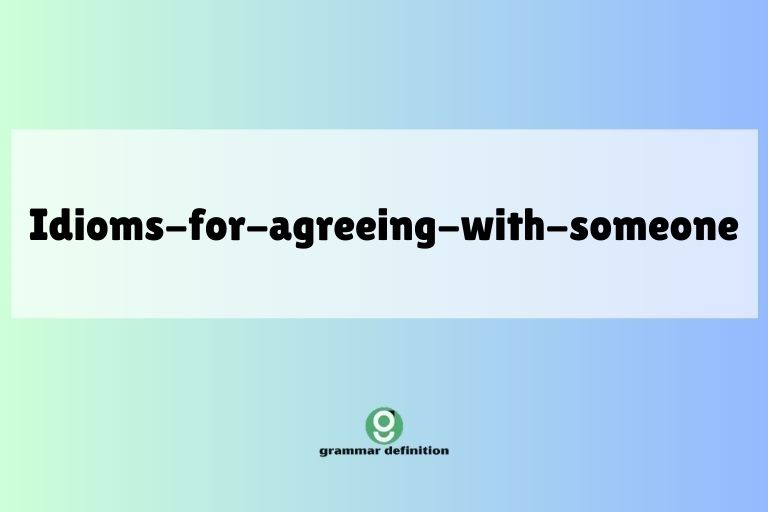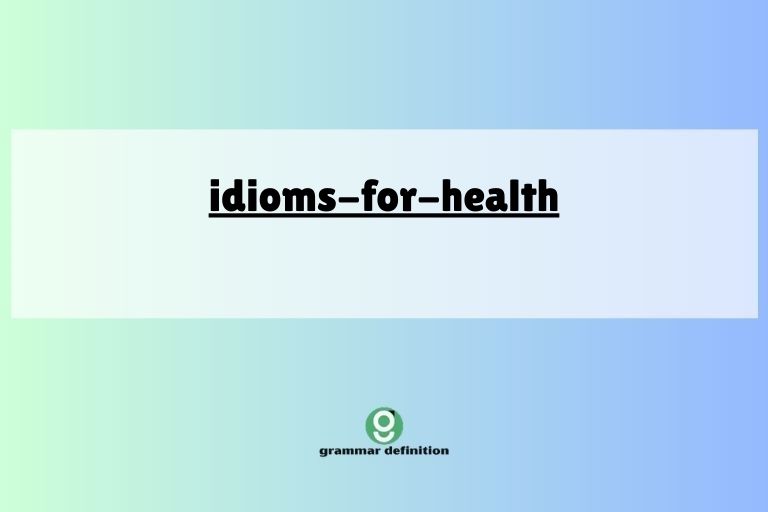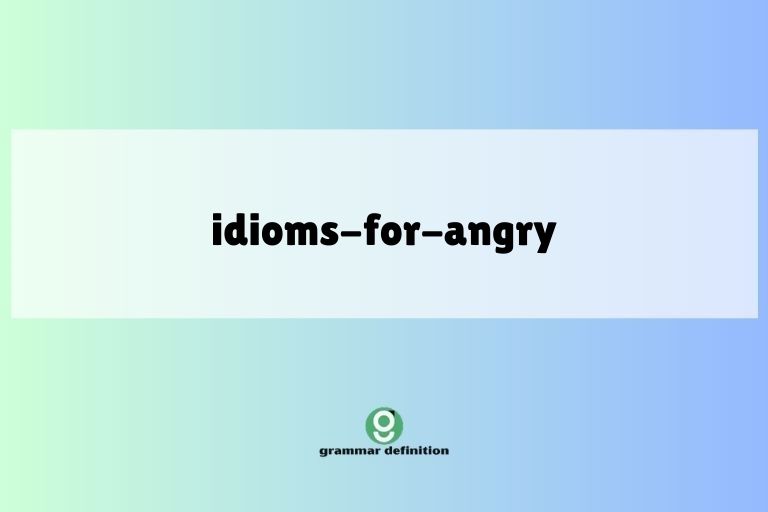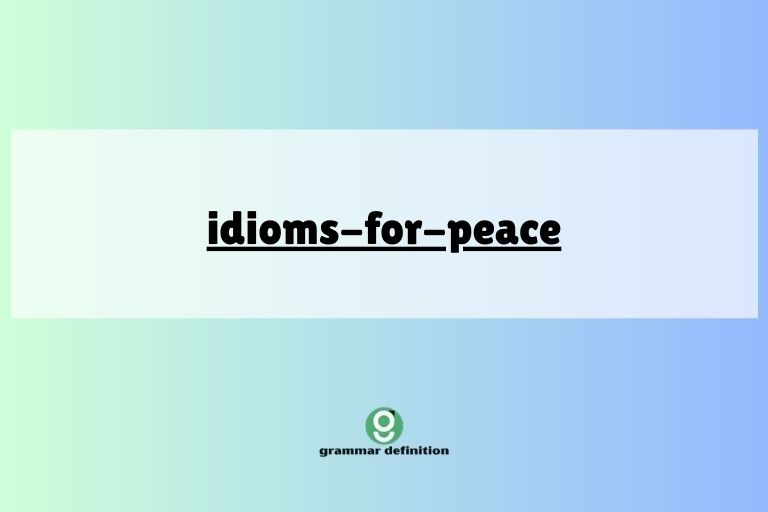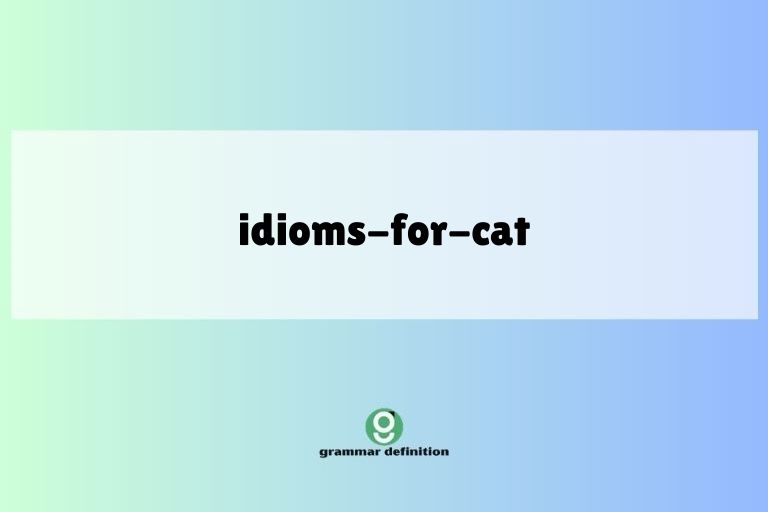Idioms for Having Fun: A Comprehensive Guide
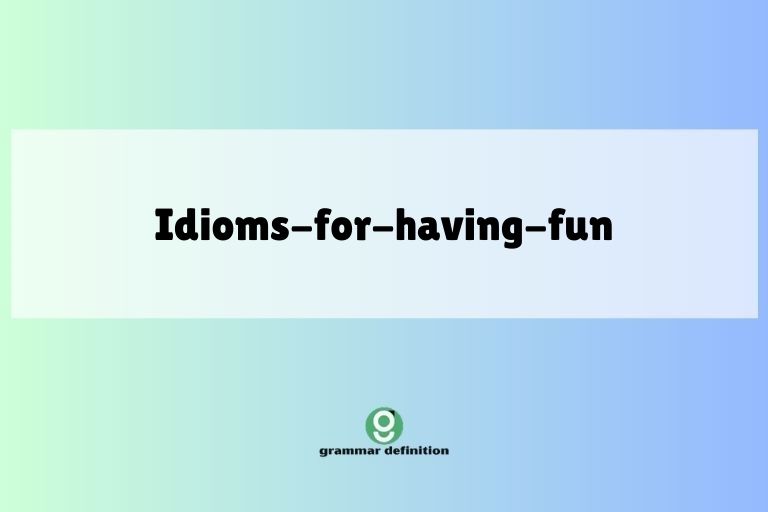
Idioms are colorful expressions that add vibrancy and depth to the English language. Understanding idioms, especially those related to leisure and enjoyment, is crucial for comprehending native speakers and enhancing your own communication.
These phrases offer insights into cultural perspectives and allow you to express yourself more creatively. This guide is designed for English language learners of all levels, from beginners seeking to expand their vocabulary to advanced speakers aiming to refine their fluency.
By exploring idioms for having fun, you’ll not only improve your language skills but also gain a better understanding of the nuances of English conversation.
Table of Contents
- Introduction
- Definition of Idioms
- Structural Breakdown of Idioms
- Types and Categories of Fun-Related Idioms
- Examples of Idioms for Having Fun
- Usage Rules for Idioms
- Common Mistakes When Using Idioms
- Practice Exercises
- Advanced Topics: Idiomatic Variations
- Frequently Asked Questions
- Conclusion
Definition of Idioms
An idiom is a phrase or expression whose meaning cannot be understood from the literal meanings of its individual words. Instead, the idiom has a figurative meaning that is known through common usage.
Idioms are culture-specific and often vary significantly between languages. They add color, expressiveness, and nuance to communication.
Understanding idioms is essential for interpreting spoken and written English accurately and for communicating more effectively.
Idioms are classified based on their function and the type of figurative language they employ. Some common categories include metaphors, similes, hyperbole, and understatement.
For instance, an idiom like “kick up your heels” (meaning to enjoy oneself) uses a metaphorical image to convey a sense of carefree fun.
Structural Breakdown of Idioms
Idioms can consist of various structural elements, including verbs, nouns, adjectives, and prepositions, combined in specific patterns. The structure of an idiom is often fixed, meaning that the words cannot be changed or rearranged without altering the idiom’s meaning or rendering it nonsensical.
For example, “paint the town red” has a specific structure that cannot be altered without losing its intended meaning of celebrating wildly.
Understanding the structural components of idioms can help learners recognize and remember them more easily. Common patterns include verb + preposition combinations (e.g., “chill out”), noun phrases (e.g., “a whale of a time”), and adjective + noun combinations (e.g., “happy camper”).
Recognizing these patterns can assist in deciphering unfamiliar idioms by providing clues to their possible meanings.
Types and Categories of Fun-Related Idioms
Idioms related to having fun can be categorized based on the specific aspect of enjoyment they describe. These categories include idioms describing excitement, enjoyment, relaxation, and celebration.
Each category captures a different nuance of the experience of having fun.
Idioms Describing Excitement
These idioms convey a feeling of thrill, anticipation, or enthusiasm. They often involve energetic actions or heightened emotional states.
Examples include “on cloud nine,” “thrilled to bits,” and “buzzing.” These phrases capture the intensity of positive emotions associated with exciting experiences.
Idioms Describing Enjoyment
These idioms express a general sense of pleasure, satisfaction, or contentment. They often describe activities or situations that bring happiness and fulfillment.
Examples include “have a blast,” “living the dream,” and “in seventh heaven.” These phrases reflect a state of overall well-being and pleasure.
Idioms Describing Relaxation
These idioms describe a state of calmness, ease, and freedom from stress. They often involve imagery of peaceful environments or leisurely activities.
Examples include “chill out,” “take it easy,” and “kick back.” These phrases convey a sense of tranquility and unwinding.
Idioms Describing Celebration
These idioms express joy, festivity, and the act of commemorating a special occasion. They often involve social gatherings, special events, or expressions of congratulations.
Examples include “paint the town red,” “let your hair down,” and “raise a glass.” These phrases capture the spirit of merriment and communal joy.
Examples of Idioms for Having Fun
To illustrate the use of idioms for having fun, consider the following examples, categorized by the type of enjoyment they describe. These examples are designed to provide context and demonstrate how these idioms can be used in everyday conversations and written communication.
Examples Describing Excitement
The following table provides examples of idioms that describe excitement, along with their meanings and example sentences. These idioms capture the feeling of thrill and anticipation.
| Idiom | Meaning | Example Sentence |
|---|---|---|
| On cloud nine | Extremely happy or elated | After winning the lottery, she was on cloud nine for weeks. |
| Thrilled to bits | Extremely pleased or excited | He was thrilled to bits when he got the acceptance letter from his dream university. |
| Buzzing | Filled with excitement and energy | The crowd was buzzing with anticipation before the concert started. |
| Over the moon | Extremely happy | She was over the moon when he proposed to her. |
| Walking on air | Feeling extremely happy or elated | Ever since she started dating him, she’s been walking on air. |
| Stoked | Very excited and enthusiastic | I’m so stoked about our upcoming vacation to Hawaii! |
| Pumped up | Feeling excited and energized | The team was pumped up and ready to win the championship game. |
| In high spirits | Feeling cheerful and energetic | The birthday party put everyone in high spirits. |
| Tickled pink | Very pleased or amused | She was tickled pink to receive such a thoughtful gift. |
| Jumping for joy | Expressing great happiness or excitement | The kids were jumping for joy when they heard they were going to Disneyland. |
| Have a spring in your step | To walk with energy and enthusiasm because you are happy | Ever since she got the new job, she’s had a spring in her step. |
| Can’t wait | To be very excited for something that is going to happen | I can’t wait for summer vacation to start! |
| On the edge of your seat | Very excited, nervous, or tense while waiting to see what happens | The movie was so suspenseful, I was on the edge of my seat the whole time. |
| Eyes lit up | To show great excitement or pleasure | His eyes lit up when he saw the new puppy. |
| Head over heels | Deeply and madly in love or excited | They fell head over heels for each other on their first date. |
| Like a kid in a candy store | Very excited and delighted, like a child in a candy store | He was like a kid in a candy store when he saw all the new gadgets at the tech expo. |
| Living for it | To be very excited about and eagerly anticipating something | I’m living for the weekend so I can finally relax. |
| On top of the world | Feeling extremely happy and successful | After acing the exam, she felt on top of the world. |
| Got a kick out of it | To find something very enjoyable or amusing | I got a real kick out of watching the comedy show last night. |
| Got a buzz out of it | To get a feeling of excitement or pleasure from something | He got a real buzz out of performing on stage. |
Examples Describing Enjoyment
The following table provides examples of idioms that describe enjoyment, along with their meanings and example sentences. These idioms capture the feeling of pleasure and satisfaction.
| Idiom | Meaning | Example Sentence |
|---|---|---|
| Have a blast | To have a very enjoyable time | We had a blast at the amusement park yesterday. |
| Living the dream | Enjoying an ideal or perfect lifestyle | After retiring and moving to the beach, he felt like he was living the dream. |
| In seventh heaven | Extremely happy | She was in seventh heaven after receiving the award. |
| A whale of a time | A very enjoyable experience | We had a whale of a time at the party last night. |
| Tickled to death | Extremely amused or pleased | She was tickled to death by the comedian’s jokes. |
| Happy as a clam | Very happy and content | He’s as happy as a clam since he started his new hobby. |
| Laugh your head off | To laugh very hard | We laughed our heads off watching the funny movie. |
| Get a kick out of something | To find something enjoyable or amusing | I get a kick out of watching old cartoons. |
| Be on top of the world | Feeling extremely happy and successful | After finishing the project, he felt like he was on top of the world. |
| Grinning from ear to ear | Smiling widely and happily | She was grinning from ear to ear when she saw her birthday present. |
| Feather in your cap | An achievement to be proud of | Getting promoted was a real feather in his cap. |
| Like taking candy from a baby | Very easy and enjoyable | The game was so easy, it was like taking candy from a baby. |
| A joyride | An enjoyable and exciting experience | The new roller coaster was a real joyride. |
| A good time was had by all | Everyone enjoyed themselves | The party was a success; a good time was had by all. |
| A blast from the past | Something that reminds you of a happy time in the past | Seeing my old friends was a blast from the past. |
| Couldn’t be happier | Extremely happy | They couldn’t be happier now that they’re married. |
| Full of the joys of spring | Cheerful and energetic | She’s always full of the joys of spring, no matter what. |
| Having the time of your life | Enjoying yourself immensely | They were having the time of their lives on their backpacking trip. |
| A real treat | Something very enjoyable or special | The concert was a real treat. |
| Living it up | Enjoying a luxurious or exciting lifestyle | They were living it up on their vacation in Monaco. |
| Having a field day | Having a lot of fun and success | The kids were having a field day playing in the snow. |
| A picnic | Something that is easy, fun, and enjoyable | The project was a picnic compared to the last one. |
Examples Describing Relaxation
The following table provides examples of idioms that describe relaxation, along with their meanings and example sentences. These idioms capture the feeling of calmness and ease.
| Idiom | Meaning | Example Sentence |
|---|---|---|
| Chill out | To relax and calm down | After a long day at work, I like to chill out and watch TV. |
| Take it easy | To relax and not worry | You’ve been working too hard; you need to take it easy. |
| Kick back | To relax and enjoy yourself | On weekends, I like to kick back and read a good book. |
| Unwind | To relax after a period of work or tension | A hot bath is a great way to unwind after a stressful day. |
| Take a load off | To relax and relieve stress | Sit down and take a load off; you look exhausted. |
| Let your hair down | To relax and enjoy yourself in a carefree way | At the party, everyone let their hair down and had a good time. |
| Rest and recuperate | To relax and recover from exertion or illness | After the surgery, he needed to rest and recuperate. |
| Put your feet up | To relax and rest | I’m going to put my feet up and relax for a while. |
| Take a break | To stop working for a short time to relax | Let’s take a break and grab some coffee. |
| Catch some rays | To sunbathe and relax in the sun | We went to the beach to catch some rays. |
| Take five | To take a short break | Let’s take five before we start the next task. |
| Slow your roll | To calm down or relax | Slow your roll; there’s no need to rush. |
| Mellow out | To become more relaxed and easygoing | He needed to mellow out after the stressful meeting. |
| Go with the flow | To relax and accept things as they come | Sometimes it’s best to just go with the flow. |
| Sleep on it | To postpone a decision until the next day after a night’s sleep | Don’t make a decision now; sleep on it and see how you feel in the morning. |
| Zone out | To relax and stop paying attention to what is happening around you | I like to zone out and listen to music after work. |
| Coast along | To proceed without much effort or difficulty | After the initial rush, the project started to coast along. |
| Take a breather | To take a short break to relax and breathe | Let’s take a breather and then get back to work. |
| Tune out | To stop paying attention to something | I try to tune out the noise when I’m trying to concentrate. |
| Unplug | To disconnect from electronic devices and relax | It’s important to unplug and spend time in nature. |
| De-stress | To reduce stress and relax | Yoga is a great way to de-stress. |
Examples Describing Celebration
The following table provides examples of idioms that describe celebration, along with their meanings and example sentences. These idioms capture the feeling of joy and festivity.
| Idiom | Meaning | Example Sentence |
|---|---|---|
| Paint the town red | To go out and celebrate in a lively way | After winning the championship, the team went out to paint the town red. |
| Raise a glass | To make a toast in celebration | Let’s raise a glass to the happy couple! |
| Hit the town | To go out and enjoy the nightlife | We decided to hit the town and have some fun. |
| Party animal | Someone who loves to party and celebrate | He’s a real party animal; he’s always out having fun. |
| Make merry | To celebrate and enjoy oneself | Let’s make merry and enjoy this special occasion. |
| Pull out all the stops | To do everything possible to make an event special | For her birthday, we pulled out all the stops and threw a huge party. |
| Break out the bubbly | To open and drink champagne in celebration | We have some good news; let’s break out the bubbly! |
| Roll out the red carpet | To give someone a special and lavish welcome | When the VIP arrived, they rolled out the red carpet. |
| Whoop it up | To celebrate in a noisy and enthusiastic way | The crowd started to whoop it up when their team scored. |
| Go to town | To do something enthusiastically and thoroughly | They really went to town decorating for the holidays. |
| Have a ball | To have a great time at a party or event | We had a ball at the wedding reception. |
| Live it up | To enjoy a luxurious or exciting lifestyle | They’re living it up on their vacation in Europe. |
| Go wild | To behave in a crazy and uncontrolled way | The fans went wild when the band came on stage. |
| Kick up your heels | To enjoy yourself in a lively and carefree way | After finishing the project, it’s time to kick up your heels. |
| Let the good times roll | To enjoy oneself and celebrate | Let the good times roll; we deserve a celebration! |
| Make whoopee | To celebrate in a noisy and lively way | They made whoopee after their team won the championship. |
| Party hearty | To party enthusiastically | Let’s party hearty tonight and celebrate our success. |
| Ring in the new year | To celebrate the start of a new year | We’re planning to ring in the new year with a big party. |
| Toast of the town | Someone who is admired and celebrated by everyone | After his incredible performance, he became the toast of the town. |
| Treat someone like royalty | To give someone special treatment and attention | They treated us like royalty during our stay at the hotel. |
| Throw a bash | To have a big and lively party | We’re throwing a bash to celebrate our anniversary. |
| Pull out the stops | To do everything possible to make an event special and impressive | They pulled out all the stops for their daughter’s wedding. |
Usage Rules for Idioms
Using idioms correctly requires understanding their specific meanings and contexts. Here are some guidelines to follow:
- Context is crucial: Idioms are often context-dependent. Their meaning can change based on the situation and the speaker’s intention.
- Word order: The word order in idioms is usually fixed. Changing the order can alter the meaning or make the idiom nonsensical.
- Tense and number: The verbs in idioms can be conjugated to match the tense and number of the sentence.
- Audience awareness: Be mindful of your audience. Some idioms may be unfamiliar to non-native speakers or inappropriate in formal settings.
Common Mistakes When Using Idioms
Learners often make mistakes when using idioms due to their non-literal nature. Here are some common errors to avoid:
| Incorrect | Correct | Explanation |
|---|---|---|
| I had a whale from a time. | I had a whale of a time. | The correct idiom is “a whale of a time,” not “a whale from a time.” |
| She is on cloud seven. | She is on cloud nine. | The correct idiom is “on cloud nine,” not “on cloud seven.” |
| Letting your hair down. | Let your hair down. | The idiom is “let your hair down,” referring to relaxing and enjoying oneself. |
| He is taking it easily. | He is taking it easy. | The correct idiom is “take it easy,” meaning to relax and not worry. |
Practice Exercises
Test your understanding of idioms for having fun with the following exercises.
Exercise 1: Fill in the Blanks
Complete the sentences with the correct idiom from the list below.
(on cloud nine, have a blast, chill out, paint the town red, let your hair down)
| Question | Answer |
|---|---|
| 1. After finishing her exams, she was _______________. | on cloud nine |
| 2. We are going to _______________ to celebrate his promotion. | paint the town red |
| 3. I just want to _______________ and watch a movie tonight. | chill out |
| 4. At the party, everyone started to _______________ and dance. | let their hair down |
| 5. We _______________ at the amusement park yesterday. | had a blast |
| 6. She’s been _______________ ever since she got engaged. | on cloud nine |
| 7. After a long week, I just want to _______________ and forget about work. | chill out |
| 8. They decided to _______________ after winning the championship. | paint the town red |
| 9. The kids _______________ at the water park. | had a blast |
| 10. It’s time to _______________ and enjoy the weekend. | let your hair down |
Exercise 2: Match the Idiom to its Meaning
Match the idiom on the left with its meaning on the right.
| Idiom | Meaning |
|---|---|
| 1. Living the dream | a. To be very happy |
| 2. In seventh heaven | b. Enjoying an ideal lifestyle |
| 3. A whale of a time | c. To relax and enjoy |
| 4. Kick back | d. A very enjoyable experience |
| 5. Happy as a clam | e. Very happy and content |
Answers:
| Question | Answer |
|---|---|
| 1 | b |
| 2 | a |
| 3 | d |
| 4 | c |
| 5 | e |
Exercise 3: Multiple Choice
Choose the correct idiom to complete each sentence.
| Question | Options | Answer |
|---|---|---|
| 1. After the successful launch, the team was ____. | a) taking it easy b) on cloud nine c) painting the town red | b) on cloud nine |
| 2. We decided to ____ and celebrate our anniversary. | a) chill out b) take a load off c) paint the town red | c) paint the town red |
| 3. After a long day, I just want to ____ and watch a movie. | a) kick back b) raise a glass c) go to town | a) kick back |
| 4. At the beach, we ____ and enjoyed the sun. | a) let our hair down b) caught some rays c) made merry | b) caught some rays |
| 5. They ____ at the party last night. | a) had a blast b) took a breather c) tuned out | a) had a blast |
| 6. He is ____ now that he’s retired and traveling the world. | a) living the dream b) on the edge of his seat c) like a kid in a candy store | a) living the dream |
| 7. The comedian’s jokes had us ____. | a) tickled pink b) laughing our heads off c) in high spirits | b) laughing our heads off |
| 8. Let’s ____ to the happy couple! | a) make whoopee b) raise a glass c) go wild | b) raise a glass |
| 9. They ____ for their daughter’s graduation. | a) pulled out all the stops b) took five c) slowed their roll | a) pulled out all the stops |
| 10. The kids were ____ playing in the snow. | a) having a field day b) coasting along c) zoning out | a) having a field day |
Advanced Topics: Idiomatic Variations
Advanced learners can explore the nuances of idiomatic variations, including regional differences and subtle shifts in meaning. Some idioms may have slight variations depending on the region, while others may have evolved over time to incorporate new cultural references.
For example, the phrase “happy as Larry” is a British idiom with a similar meaning to “happy as a clam,” but it is less commonly used in American English. Understanding these variations can enhance your ability to communicate effectively in diverse contexts.
Furthermore, idioms can be creatively adapted or combined to create new expressions. This requires a deep understanding of the underlying meanings and structural patterns of idioms.
For instance, one might playfully combine “on cloud nine” and “walking on air” to describe an exceptionally joyful experience. These advanced techniques can add a unique flair to your language skills.
Frequently Asked Questions
Here are some frequently asked questions about idioms for having fun:
- What is the best way to learn idioms?
Exposure is key. Read widely, listen to native speakers, and pay attention to how idioms are used in context. Keep a notebook of new idioms and practice using them in your own conversations. Flashcards and language learning apps can also be helpful.
- Are idioms the same in all English-speaking countries?
No, idioms can vary significantly between different English-speaking countries. Some idioms are specific to certain regions or cultures. Be aware of these differences and tailor your language accordingly.
- Can I use idioms in formal writing?
While idioms can add color to your writing, they are generally more appropriate for informal contexts. In formal writing, it’s best to use more direct and literal language.
- How can I avoid misusing idioms?
Pay close attention to the context in which idioms are used. Look up the meaning of unfamiliar idioms and practice using them in simple sentences. Ask native speakers for feedback on your usage.
- What should I do if I don’t understand an idiom?
Don’t be afraid to ask for clarification. Most native speakers will be happy to explain the meaning of an idiom. You can also consult a dictionary or online resource for help.
- How do I know when to use an idiom?
Consider your audience and the context of the conversation. Idioms are most appropriate when speaking with friends, family, or colleagues in informal settings. Avoid using idioms in situations where clarity and precision are paramount.
- Why are idioms so difficult to learn?
Idioms are challenging because their meanings are not literal and often rely on cultural knowledge. They require memorization and an understanding of the underlying metaphors or similes.
- Are there any resources that can help me learn idioms?
Yes, there are many resources available, including idiom dictionaries, online quizzes, language learning apps, and textbooks. Look for resources that provide context and examples of how idioms are used in real-life situations.
Conclusion
Mastering idioms for having fun will significantly enhance your English communication skills and cultural understanding. By learning to recognize and use these colorful expressions, you’ll be able to express yourself more creatively and connect with native speakers on a deeper level.
Remember that understanding the context, practicing regularly, and being mindful of your audience are key to using idioms effectively.
Continue to expand your vocabulary, explore new idioms, and immerse yourself in the English language. With consistent effort and a willingness to learn, you’ll be well on your way to mastering the art of idiomatic expression.
Embrace the richness and diversity of the English language, and enjoy the journey of becoming a more fluent and confident communicator.

